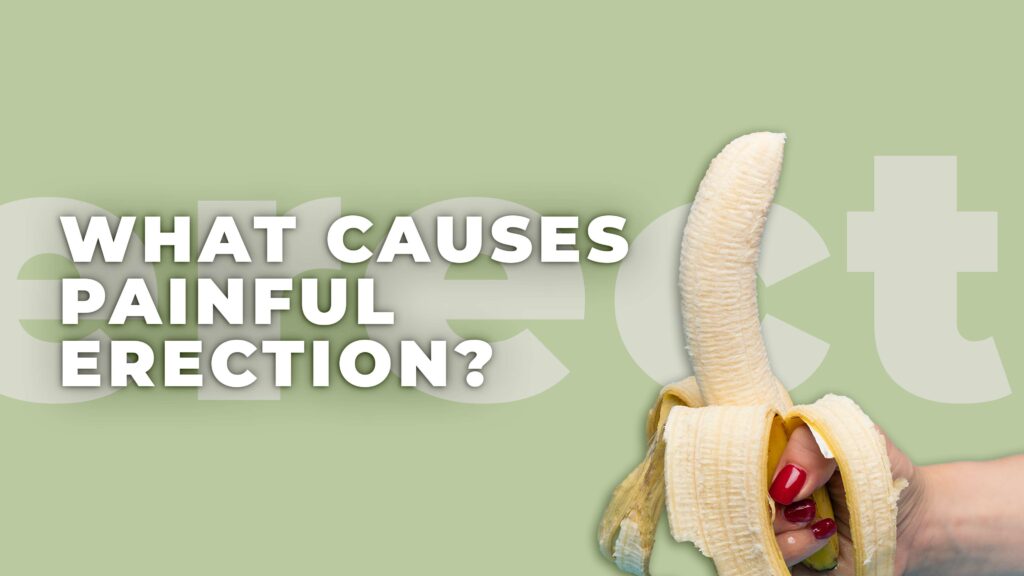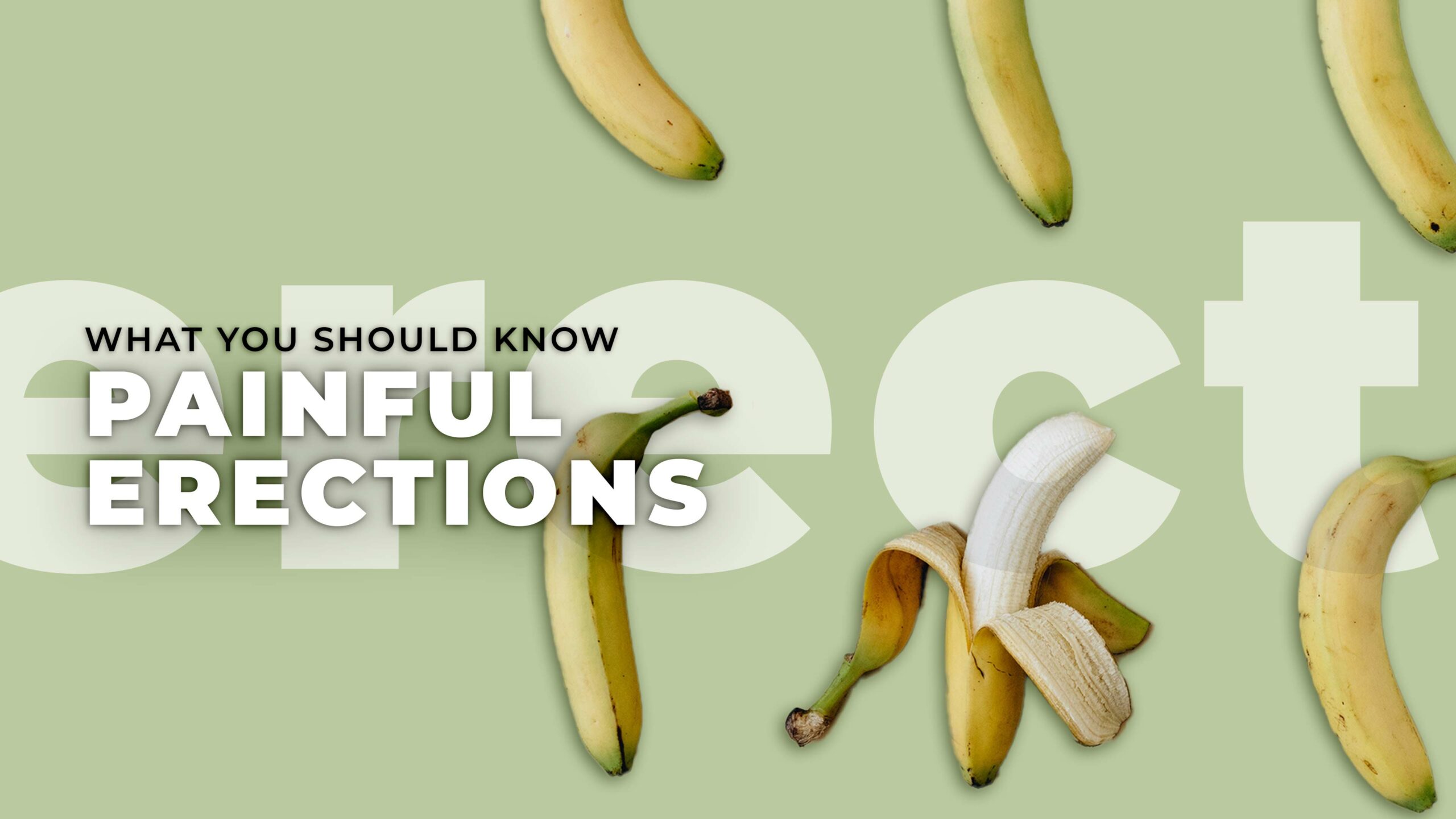Ever wondered why your erections are causing discomfort? Unveil the mysteries of painful erections – an awkward topic that deserves attention. From priapism to infections, this article delves into the causes and treatment options. It also explores how to discuss it with your partner. Learn to cope with the emotional impact, seek help, and find relief. Ready to tackle this discomfort head-on?
Painful Erections
Painful erections, or priapism, are uncomfortable and distressing conditions many men experience. But what exactly are painful erections? Well, simply put, it’s when the penis hurts when hard. During an erection, the penis becomes firm due to increased blood flow. But, in cases of priapism, the blood gets trapped in the penis. This further leads to prolonged and painful erections.
Penile pain can affect various parts of the penis, including the head, base, and shaft, as well as the skin on the feet. It is often accompanied by itching, burning, and throbbing symptoms. The cause of penile pain can be attributed to injuries or underlying medical conditions, and it can affect men of all ages.
It is possible for the pain to vary depending on which underlying condition or disease it is. The pain can be sudden and severe if you sustain an injury. And it can be mild or progressive if you have a condition.
Any kind of pain in the penis should be considered a concern, especially if it occurs during erection or prevents urination, or is associated with discharge, redness, or swelling.
What Causes Painful Erection?

TPainful erections can have various causes. Understanding them is essential for seeking appropriate treatment and support. So, what exactly causes painful erections? There are several factors that can contribute to this condition. These include:
1. Peyronie’s Disease
It happens when inflammation creates a thin layer of scar tissue along your penis shaft. The scar tissue is also known as called Plaque. You might see your penis bend during an erection. This is because the scar tissue is near the hard tissue that forms during ED.[1]
If bleeding begins in the penis after bending or hitting it, or if your lymphatic or blood vessels get inflamed, this can lead to the disease. Some people can inherit the disease, while others may not know the exact cause.
2. Priapism
Priapism can also cause a painful and prolonged erection. Even if you don’t desire to have sex, pain with an erection can occur. This condition is more common in men aged 30 and older.[1] The following could be the cause of priapism:
- Side effects of drugs that are used to treat erection issues or drugs that treat depression
- blood clotting disorders
- mental health disorders
- Blood disorders such as Leukemia and Sickle Cell Anemia
- alcohol use
- Illegal drug use
- Injury to the penis or spinal cord
3. Balanitis
Balanitis refers to an infection of the penis and foreskin. This infection usually affects males and females who don’t wash their underarms regularly or have not been circumcised. It can also affect boys and men who have been circumcised. Balanitis may also be caused by the following:
- A yeast infection
- A sexually transmitted disease (STI)
- An allergy to soap, perfumes, or other products
4. Sexually transmitted Infections (STIs)
Sexually transmitted infections (STIs) are a common cause of penile pain. Some of the most common STIs that can lead to penile pain include:
Chlamydia
Chlamydia is a bacterial infection that is transmitted through sexual contact. It can cause pain or discomfort during urination and discharge from the penis.
Gonorrhea[2]
Gonorrhea is another bacterial infection that is transmitted through sexual contact. It can cause similar symptoms to chlamydia and pain or swelling in the testicles.
Genital herpes
Genital herpes is a viral infection that is caused by the herpes simplex virus. It can cause painful sores or blisters on or around the penis and itching and burning sensations.
Syphilis
Syphilis is a bacterial infection that can cause a wide range of symptoms. This includes a painless sore on the genitals or rectum, fever, swollen lymph nodes, and a rash. If left untreated, syphilis can cause serious health problems. Syphilis can also cause heart, brain, and nerve damage.
5. Urinary tract infections (UTIs).
While a UTI (urinary tract infection) is more common among women, it can also occur in men. UTI is when bacteria infect your urinary tract. An infection might happen if you:
- Are not circumcised
- Have a weak immune system
- Have a problem with your urinary tract?
- Have sex while you have an infection.
- Have anal sex
- Have an enlarged prostate
6. Injuries
Penis injuries can cause damage like any other part of your body. If you are not careful, injuries can occur.
- are in a car accident
- get burned
- Get rough sex
- To prolong an erection, wrap a ring around the penis.
- Insert objects into your Urethra
7. Paraphimosis and Phimosis
Phimosis happens in males who are not circumcised and have a tight foreskin. It cannot be pulled from the penis head. This is most common in children. But, it can also happen in older men if there’s injury or balanitis.
Paraphimosis happens when your foreskin pulls back from the head of your penis and can’t go back.
Paraphimosis can be a serious medical emergency. It can cause you to stop urinating and cause your penis tissue to become cancerous.
8. Cancer
Penile cancer can also cause penile pain. Yet, it is rare. Most cases of penile carcinoma occur in men over 55 years old.[3] There are several factors that increase your chance of getting cancer. These include:
- smoking
- Not being circumcised
- Having a HPV (human papillomavirus)
- If you aren’t properly circumcised, don’t clean under your foreskin
- being treated for Psoriasis
It’s worth noting that psychological factors can play a role as well. Stress, anxiety, and depression can all impact sexual health. These may even contribute to painful erections. Addressing these underlying mental health concerns can be important in managing the condition.
How To Treat Pain While Erect State?

If you’re experiencing painful erections, seeking appropriate treatment to alleviate discomfort and prevent potential complications is crucial. The treatment for painful erections will depend on your condition’s underlying cause and severity.
Treating the pain during an erect state can involve different approaches. Some individuals find relief through lifestyle changes, such as incorporating relaxation techniques or avoiding triggers that worsen the pain. Medications may also be prescribed to alleviate the discomfort, and in severe cases, medical procedures may be necessary to relieve the trapped blood and restore normal blood flow.
Following are some treatment options to treat pain while erect:
- Injections can soften the plaques of Peyronie’s Disease. In severe cases, a surgeon may be able to remove them.
- If you suffer from priapism, you can drain the blood from your penis using a needle. This will reduce the likelihood of an unpleasant erection. The amount of blood that flows to the penis may be reduced by medication.
- Antibiotics are used to treat UTIs as well as some STIs, such as chlamydia and gonorrhea. Balanitis can be treated with antifungal and antibiotic medications.
- Antiviral medication can be used to reduce or stop the spread of herpes.
- If you have phimosis, stretching the foreskin by moving your fingers could make it more flexible. You can also try rubbing steroids on your penis. Sometimes, surgery may be necessary.
- Paraphimosis can be reduced by icing your penis’s head. Your doctor might suggest applying pressure to the penis’ head. To drain the penis, they may inject medication into it. They can also make minor cuts to the skin of the foreskin in order to reduce swelling.
- The surgeon can remove any cancerous areas of the penis. Penile cancer treatment may include radiation or chemotherapy.
Every individual is different, and what works for one person may not work for another. Working with your doctor is crucial in determining the best treatment plan. They can evaluate your symptoms, consider your medical history, and recommend appropriate interventions to help treat the pain during erect states.
When To See a Doctor For Painful Erections?
If you are experiencing painful erections, it’s crucial to know when it’s time to seek medical help. Occasional discomfort during an erection may not be a cause for alarm. But, there are certain signs that indicate you should consult a doctor.
One important factor to consider is the duration of the pain. If you have an erection that lasts longer than four hours, it is a medical emergency. Also, if you have painful erections often, you should see a doctor.
Another red flag is the severity of the pain. If your erections are causing you intense discomfort or if the pain worsens, consult a doctor. They can evaluate your symptoms and determine the underlying cause.
If you have conditions like sickle cell disease, leukemia, or diabetes, your risk of priapism increases. It’s crucial to stay alert and seek medical help if you have painful erections. Talking to a doctor can identify causes and create a proper treatment plan. Don’t hesitate to reach out for professional guidance and support.
Treatment Options For Painful Erections
When it comes to finding relief for painful erections, several treatment options are available. The right approach will depend on your condition’s underlying cause and severity.
If medication is causing your painful erections, your doctor may change your prescription. He may switch to a different medication with fewer sexual health side effects. If blood thinners are the problem, they could think about other choices that don’t affect your blood flow control.
In some cases, treating the underlying medical condition may reduce the discomfort. If you have sickle cell disease or diabetes, you can manage and control them. This can help lessen the frequency and severity of painful erections.
In severe cases, a healthcare professional may need to perform medical procedures. These procedures can include draining trapped blood or using medication injections to constrict blood vessels and reduce blood flow.
Therapy and counseling can help with psychological factors that cause painful erections. Stress, anxiety, and depression can all impact sexual health. Working with a therapist can provide support and strategies for managing these emotions.
Remember, painful erections are a medical condition that deserves attention and treatment. Don’t hesitate to seek professional help and explore your options for finding relief.
Tips For Discussing Painful Erections With Your Partner
Discussing painful erections with your partner might seem uncomfortable and awkward. Hence, it’s crucial for your relationship and well-being. Here are some tips to help you navigate this sensitive topic with your partner:
Choose the right time and place:
Find a quiet and private setting where you both feel comfortable and won’t be interrupted. Pick a moment when you’re both relaxed and open to having a meaningful conversation.
Be open and honest:
Be transparent with your partner about what you’re experiencing. Use clear and direct language to describe your symptoms and how they make you feel. This can help your partner understand the gravity of the situation.
Educate yourselves:
Research the condition together to understand better what causes painful erections. This can help both of you feel more informed and less anxious about the situation.
Encourage open communication:
Make sure your partner feels comfortable asking questions and expressing their concerns. Create a safe space for both of you to share your feelings and emotions openly.
Seek professional help together:
Suggest visiting a healthcare provider to discuss the condition and explore treatment options. This shows your partner you’re serious about addressing the issue and finding a solution.
Discussing painful erections with your partner can lead to a stronger bond and a better understanding of your needs. Together, you can navigate this challenge and find support along the way.
Coping With The Emotional Impact of Painful Erections
Painful erections can impact both your body and emotions. It’s common to feel various emotions like frustration, embarrassment, anxiety, and even depression when faced with this challenge. Knowing how to cope with these emotions is vital for managing the condition and maintaining a positive mindset.
One of the first steps in coping with the emotional impact is acknowledging and accepting your feelings. It’s okay to feel upset or worried about the pain you’re experiencing. It’s important to remember that you are not alone in this, and seeking support from your partner, friends, or a therapist can make a big difference. Sharing your emotions with someone you trust can help lighten the burden and provide a safe space to express your concerns.
In addition to seeking emotional support, practicing self-care is essential for managing the emotional impact of painful erections. Engaging in activities that bring you joy and relaxation, such as hobbies, exercise, or mindfulness techniques, can help reduce stress and anxiety. Taking care of your mental health through regular exercise, healthy eating, and getting enough sleep can also contribute to overall well-being.
Educating yourself about the condition can also be empowering and can help alleviate anxiety. Understanding what causes painful erections can help you navigate the condition and feel more in control. Knowing that there are treatment options available can also provide hope and optimism for the future.
Finally, be patient and kind to yourself as you navigate this challenging condition. It’s important to remember that you are not defined by your condition and that seeking treatment and support is a courageous and important step toward managing and overcoming painful erections. You are strong, and you deserve to prioritize your health and well-being.
The Final Thought
Having painful erections can be difficult to discuss with your partner. It can be an awkward and embarrassing conversation to have. However, discussing it is important for understanding the condition and seeking help. Painful erections are an uncomfortable condition that can occur if blood remains trapped in the penis for too long. It’s important to talk to your partner about painful erections and to be open and honest about any symptoms you’re experiencing.
Frequently Asked Questions

1. What is the cause of my painful erections during sleep?
It is rare to experience painful erections while you sleep. Priapism is a condition that causes an erection without sexual desire. This is a serious condition that should be evaluated by a doctor. Sickle cell disease is the most common cause of painful erections during sleep. This disease affects red blood cells and can lead to blockages in blood vessels.
2. Why are my erections so painful and long?
Priapism is a condition that causes painful and long-lasting erections. If the condition lasts more than four hours, it is considered serious and requires immediate treatment. Priapism can occur with no clear cause or be caused by conditions like sickle cell disease or thalassemia.
Some medications can also cause priapism, including antidepressants and antipsychotics, blood pressure medications, blood pressure medications, antidepressants, and antipsychotics as well as recreational drugs.
3. Is a UTI a cause of painful erections?
UTIs (urinary tract infections) are not known to cause painful erections. UTIs in men are rare. They are often caused by structural abnormalities in the bladder or catheter placement. UTI symptoms include frequent, painful, or urgent urination, as well as bladder pain and changes in urine color. UTI symptoms include fever, lightheadedness, fatigue, and chills.
4. Do STDS cause painful erections?
Although STDs (also known as sexually transmitted infections or STIs) don’t cause painful erections, they can cause burning or pain with ejaculation. Open sores on your penis may cause pain due to an STD infection. You should consult a doctor if you notice sores on the penis or if you feel itching or burning with ejaculation.
References
- Goldstein I, Hartzell R, Shabsigh R. The Impact of Peyronie’s Disease on the Patient: Gaps in Our Current Understanding. J Sex Marital Ther. 2016;42(2):178-90. doi: 10.1080/0092623X.2014.985351. Epub 2015 Jan 9. PMID: 25405853. https://pubmed.ncbi.nlm.nih.gov/25405853/
- IASH, T. (2022) Priapism: Symptoms, causes & treatment – IASH, IASH India: Institute of Andrology & Sexual Health India. https://iashindia.com/priapism/
- Risk factors for penile cancer American Cancer Society. Available at: https://www.cancer.org/cancer/penile-cancer/causes-risks-prevention/risk-factors
- Gonorrhea — CDC fact sheet. (2014). cdc.gov/std/gonorrhea/STDFact-gonorrhea.htm










Leave a reply